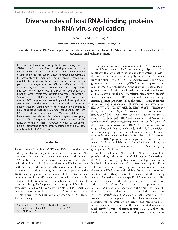摘要
Plus-strand (+) RNA viruses co-opt host RNA-binding proteins (RBPs) to perform many functions during viral replication. A few host RBPs have been identified that affect the recruitment of viral (+) RNAs for replication. Other subverted host RBPs help the assembly of the membrane-bound replicase complexes, regulate the activity of the replicase and control minus- or plus-strand RNA synthesis. Host RBPs also affect the stability of viral RNAs, which have to escape cellular RNA degradation pathways. While many host RBPs seem to have specialized functions, others participate in multiple events during infection. Several conserved RBPs, such as eEF1A, hnRNP proteins and the Lsm 1-7 complex, are co-opted by evolutionarily diverse (+) RNA viruses, underscoring some common themes in virus-host interactions. On the other hand, viruses also hijack unique RBPs, suggesting that (+) RNA viruses could utilize different RBPs to perform similar functions. Moreover, different (+) RNA viruses have adapted distinctive strategies for co-opting unique RBPs. Altogether, a deeper understanding of the functions of the host RBPs subverted for viral replication will help development of novel antiviral strategies and give new insights into host RNA biology.
- 出版日期2011-4
